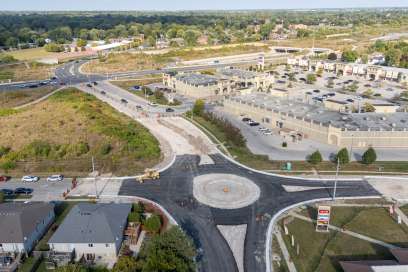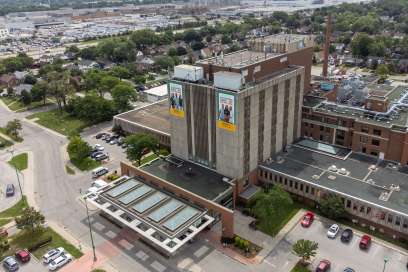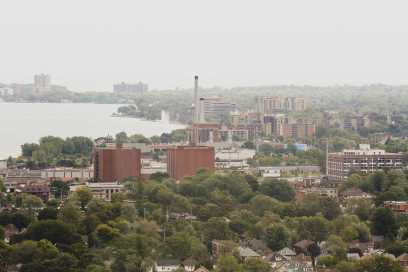Rain Garden Planned For Seacliff Park
Monday June 16th, 2014, 3:00pm
Hello time traveller!!
This article is 4111 days old.
The information listed below is likely outdated and has been preserved for archival purposes.

Members from the Leamington Horticultural Society join Leamington Councillors Wright, Verbeeke and Atkin and Shaun Anthony and General Manager Richard Wyma of ERCA to create the rain garden at Seacliff Park.
The Essex Region Conservation Authority, Municipality of Leamington and Leamington Horticultural Society are teaming up to create a Rain Garden at Seacliff Park. “Rain gardens are considered to be a sustainable, low impact development tool to manage stormwater and improve water quality,” explained Shaun Anthony, ERCA’s Water Quality Specialist. “They are gaining momentum in both urban and rural areas.”
This is ERCA’s second rain garden partnership project. The first was completed in Harrow in 2013.
Rain gardens divert stormwater away from storm sewers and allow for the water to filter through the ground slowly, thereby reducing the amount of runoff entering the Great Lakes and their connecting channels. This helps protect properties from flooding while also protecting streams and lakes from pollutants in urban runoff including lawn fertilizers, pesticides, oil and grease. Rain gardens also allow for the uptake of water and nutrients by native plant species.
“Seacliff Park is an ideal place to showcase the benefits of a rain garden to the citizens of Leamington and to its many visitors,” said Deputy Mayor Charlie Wright. “Undoubtedly, this will inspire more rain gardens to manage our most precious resource.”
Members of the Leamington Horticultural Society (LHS) have volunteered to plant the native plant species that will create the rain garden. In addition to their filtering function, these plants also significantly improve the attractiveness of this engineered feature, and serve as important food and shelter for pollinators, including the monarch butterfly. Volunteers from LHS will also assist in the ongoing maintenance of the garden. “In developing a rain garden, you are not only beautifying your neighbourhood, but providing a home for wildlife while utilizing stormwater runoff,” explained Ken Clark, President. “We are proud to have been a partner in the creation of this rain garden and will do our part in helping to assure its success.”
“The western basin of Lake Erie has had significant challenges with blue-green algae blooms in recent years,” added Councillor Rick Atkin, ERCA Board Member. “These have severely impacted our use of the Lake, and it’s important we work together as a community to help protect it through practices like rain gardens, reducing phosphorus use and through other behaviour changes.”
A Rain Garden Guide and how-to video have been produced and are available at www.erca.org to help others who wish to do similar projects. “We hope that when local residents see how easy it is to create a rain garden, and how attractive this water management feature can look, that it will spearhead the creation of several rain gardens in the Lake Erie watershed, ultimately reducing nutrient loadings and providing a cumulative benefit to our Great Lakes,” added Anthony. If you are interested in learning about creating a rain garden on your own property, you are invited to contact ERCA directly.























